-
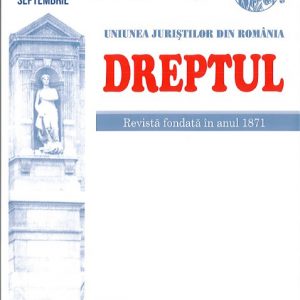 The current Civil Procedure Code has brought some changes in respect of the evidence with the interrogatory, changes which are discussed in this study. Thus, for example, the court has the possibility to proceed to the confrontation of the parties and, in case of the interrogatory of the persons who are abroad, according to the new regulation, the condition of domicile situated abroad is no longer necessary, being sufficient for the party to be abroad for a longer period of time. I have discussed punctually the administration of the evidence with the interrogatory in the case of the natural person, in the case of the legal person, in the situation of the persons who are abroad, as well as the effects of the absence from the interrogatory or of the refusal to answer to it. Since the confession is currently regulated by the Civil Procedure Code, unlike the former regulation, when it could be found in the Civil Code of 1864, I have presented the most important aspects concerning the judicial confession.
The current Civil Procedure Code has brought some changes in respect of the evidence with the interrogatory, changes which are discussed in this study. Thus, for example, the court has the possibility to proceed to the confrontation of the parties and, in case of the interrogatory of the persons who are abroad, according to the new regulation, the condition of domicile situated abroad is no longer necessary, being sufficient for the party to be abroad for a longer period of time. I have discussed punctually the administration of the evidence with the interrogatory in the case of the natural person, in the case of the legal person, in the situation of the persons who are abroad, as well as the effects of the absence from the interrogatory or of the refusal to answer to it. Since the confession is currently regulated by the Civil Procedure Code, unlike the former regulation, when it could be found in the Civil Code of 1864, I have presented the most important aspects concerning the judicial confession. -
 In this study, starting from a decision of the Bucharest Court of Appeal, the author examines two important aspects in the field of labour relations. On the one hand, he speaks about the incidence of the legal obligation of loyalty exclusively during the performance of the individual labour contract and, on the other hand, about the possibility of the court properly seized to judge the application of the employee on challenging the dismissal decision, although the decision in question did not contain accordingly all the elements required by Article 252 (2) of the Labour Code.
In this study, starting from a decision of the Bucharest Court of Appeal, the author examines two important aspects in the field of labour relations. On the one hand, he speaks about the incidence of the legal obligation of loyalty exclusively during the performance of the individual labour contract and, on the other hand, about the possibility of the court properly seized to judge the application of the employee on challenging the dismissal decision, although the decision in question did not contain accordingly all the elements required by Article 252 (2) of the Labour Code. -
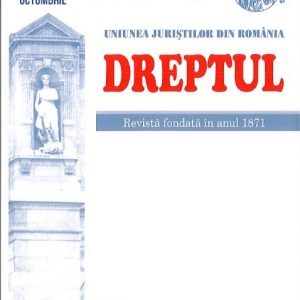 Some constitutional precepts may arise through case law path and, depending on their importance as real or formal sources for the constitutional law, there may be included in the constitutional base, as prof. I. Deleanu noticed. It is similar case for the constitutional category formed by the democratic traditions of the Romanian people. The present study aims the application of the historical interpretation method in the Romanian Constitutional Court case law, that produced two main effects. A first well-known effect of this type of constitutional case law is the adoption process of the Romanian democratic traditions in the Romanian Constitution. The application of the retrodiction in the Romanian Constitutional Court case law, as specific practice of the historical method, produces a second type of effect on the interdisciplinary category represented by the democratic traditions of the Romanian people, that, by nominating the legal or political documents that are representative for the political history of our country, may lead to the detection of the founding document for the Romanian constitutionalism. In the next place, the study aims to answer the question referring to the public law document belonging to the national political history, whereat the constitutional resort will insist in the process of building a new constitutional precept, that involves the reconnection of the constitutional tradition to an originated democratic and national stream, guiding also the sense of its foundation through the praetorian anchoring to the oldest document that typologically corresponds.
Some constitutional precepts may arise through case law path and, depending on their importance as real or formal sources for the constitutional law, there may be included in the constitutional base, as prof. I. Deleanu noticed. It is similar case for the constitutional category formed by the democratic traditions of the Romanian people. The present study aims the application of the historical interpretation method in the Romanian Constitutional Court case law, that produced two main effects. A first well-known effect of this type of constitutional case law is the adoption process of the Romanian democratic traditions in the Romanian Constitution. The application of the retrodiction in the Romanian Constitutional Court case law, as specific practice of the historical method, produces a second type of effect on the interdisciplinary category represented by the democratic traditions of the Romanian people, that, by nominating the legal or political documents that are representative for the political history of our country, may lead to the detection of the founding document for the Romanian constitutionalism. In the next place, the study aims to answer the question referring to the public law document belonging to the national political history, whereat the constitutional resort will insist in the process of building a new constitutional precept, that involves the reconnection of the constitutional tradition to an originated democratic and national stream, guiding also the sense of its foundation through the praetorian anchoring to the oldest document that typologically corresponds. -
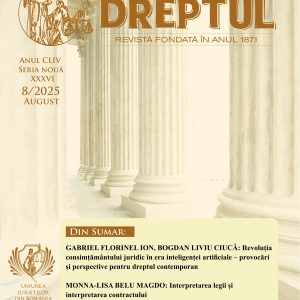
-
 The study deals with the manner in which the provisions of Article 227 (1) of the Criminal Procedure Code should be interpreted. It emphasizes that, although it should have been a relatively easy activity, by reference to the historical perspective, to the evolution of the texts which regulated this matter over time and to the rules set by the ECHR case law with reference to the preventive deprivation of liberty, reality proved that the judicial practice had encountered serious difficulties in interpreting and applying the provisions in question, with important repercussions also on other institutions in relation to the preventive measures. This doctrinal approach intends to analyze the different interpretations of Article 227 (1) of the Criminal Procedure Code and to propose a thoroughly reasoned manner of interpretation and application.
The study deals with the manner in which the provisions of Article 227 (1) of the Criminal Procedure Code should be interpreted. It emphasizes that, although it should have been a relatively easy activity, by reference to the historical perspective, to the evolution of the texts which regulated this matter over time and to the rules set by the ECHR case law with reference to the preventive deprivation of liberty, reality proved that the judicial practice had encountered serious difficulties in interpreting and applying the provisions in question, with important repercussions also on other institutions in relation to the preventive measures. This doctrinal approach intends to analyze the different interpretations of Article 227 (1) of the Criminal Procedure Code and to propose a thoroughly reasoned manner of interpretation and application. -
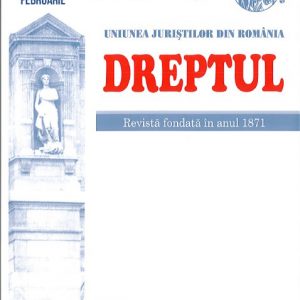 The Romanian Labour Code (the Law No 53/2003, republished on 18 May 2011) provides, in Article 38, that „Employees may not waive the rights recognized to them by law. Any transaction which aims at waiving the rights recognised by law for the employees or at limiting such rights shall be null.” The author starts from the premise that this legal text, which could also be found in the previous Labour Code (Law No 10/1972), should be reconsidered, however, in the light of the social order of today, of the principles and of the requirements of the market economy and of the dynamics of the labour relations and of the labour market. Considering the above, the author formulates, in accordance with the Romanian labour law doctrine as well, a flexible interpretation of Article 38 of the Labour Code, also taking into account a series of texts of the new Romanian Civil Code, which entered into force on 1 October 2011, by rallying, at the same time, to a number of de lege ferenda proposals elaborated in the labour law doctrine over the last years.
The Romanian Labour Code (the Law No 53/2003, republished on 18 May 2011) provides, in Article 38, that „Employees may not waive the rights recognized to them by law. Any transaction which aims at waiving the rights recognised by law for the employees or at limiting such rights shall be null.” The author starts from the premise that this legal text, which could also be found in the previous Labour Code (Law No 10/1972), should be reconsidered, however, in the light of the social order of today, of the principles and of the requirements of the market economy and of the dynamics of the labour relations and of the labour market. Considering the above, the author formulates, in accordance with the Romanian labour law doctrine as well, a flexible interpretation of Article 38 of the Labour Code, also taking into account a series of texts of the new Romanian Civil Code, which entered into force on 1 October 2011, by rallying, at the same time, to a number of de lege ferenda proposals elaborated in the labour law doctrine over the last years. -

-
 As a fundamental instrument for ensuring the functioning of the European Union legal order, the action for the non-compliance with the European obligations is the judicial instrument by which the Union authorities, led by the Commission and the Luxembourg jurisdictional structure, exercise direct control over the conduct of the Member States in relation to EU law imperatives. Located somewhere in the middle between the legality control and the action for liability, the non-compliance with the obligations raises separate and complex issues difficult to understand in the absence of the vast jurisdictional experience of the Court of Justice of the European Union. If, under procedural terms, the present action does not present particular challenges, imposing, as a rule, a mechanism for cooperation between the European Commission and the defendant Member State (as a pre-contentious phase), in which the Court of Justice often plays a subsidiary role (contentious phase), from a material point of view, the non-compliance with the European obligations involves different forms and meanings that transcend both the letter and the spirit of the treaties, even in their current form, consolidated after the Treaty of Lisbon (2009). In such a context, the present study aims to review the most frequently used meanings which the case law of the Court of Justice of the European Union has given to the phrase „non-compliance with European obligations”, in the light of current regulations, past experiences and, last but not least, the aim pursued by this procedure, namely to sanction any derogation from the uniform and synchronized application of the European Union law.
As a fundamental instrument for ensuring the functioning of the European Union legal order, the action for the non-compliance with the European obligations is the judicial instrument by which the Union authorities, led by the Commission and the Luxembourg jurisdictional structure, exercise direct control over the conduct of the Member States in relation to EU law imperatives. Located somewhere in the middle between the legality control and the action for liability, the non-compliance with the obligations raises separate and complex issues difficult to understand in the absence of the vast jurisdictional experience of the Court of Justice of the European Union. If, under procedural terms, the present action does not present particular challenges, imposing, as a rule, a mechanism for cooperation between the European Commission and the defendant Member State (as a pre-contentious phase), in which the Court of Justice often plays a subsidiary role (contentious phase), from a material point of view, the non-compliance with the European obligations involves different forms and meanings that transcend both the letter and the spirit of the treaties, even in their current form, consolidated after the Treaty of Lisbon (2009). In such a context, the present study aims to review the most frequently used meanings which the case law of the Court of Justice of the European Union has given to the phrase „non-compliance with European obligations”, in the light of current regulations, past experiences and, last but not least, the aim pursued by this procedure, namely to sanction any derogation from the uniform and synchronized application of the European Union law. -
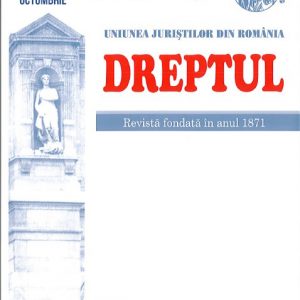 This study has as object the incidental regulations in the matter of illegal border crossings and of asylum, as well as how they intersect, and it intends to find an adequate solution for what happens with the criminal prosecution, in the cases of fraudulent crossings of the state border, in the course of solving the application for being granted a form of protection submitted by the person who has illegally crossed the border. It is proposed the intervention of the legislator in the sense of introducing a rule which provides as cause of suspension of the criminal prosecution the situation where the person wanted for the fraudulent crossing of the state border has subsequently submitted an application for being granted a form of protection and is subject to the asylum procedure. The need for such intervention is motivated by the ineffectiveness of continuing the criminal prosecution and of the settlement of the case provided that, at the end of the asylum procedure, the person concerned can be granted a form of protection from among those recognized by the Law No 122/2006, the cause of non-punishment provided in Article 11 of this law being thus incidental.
This study has as object the incidental regulations in the matter of illegal border crossings and of asylum, as well as how they intersect, and it intends to find an adequate solution for what happens with the criminal prosecution, in the cases of fraudulent crossings of the state border, in the course of solving the application for being granted a form of protection submitted by the person who has illegally crossed the border. It is proposed the intervention of the legislator in the sense of introducing a rule which provides as cause of suspension of the criminal prosecution the situation where the person wanted for the fraudulent crossing of the state border has subsequently submitted an application for being granted a form of protection and is subject to the asylum procedure. The need for such intervention is motivated by the ineffectiveness of continuing the criminal prosecution and of the settlement of the case provided that, at the end of the asylum procedure, the person concerned can be granted a form of protection from among those recognized by the Law No 122/2006, the cause of non-punishment provided in Article 11 of this law being thus incidental. -
 This study proposes the approach of an identified problem with regard to the regulation of the manner of applying the complementary punishment of prohibition to exercise some rights. By the analysis made within this study, the author identifies a situation of inequity which can arise in precise cases between the case of the sentenced person conditionally released from serving the punishment of life imprisonment and the case of the conditionally released person sentenced to imprisonment in detention.
This study proposes the approach of an identified problem with regard to the regulation of the manner of applying the complementary punishment of prohibition to exercise some rights. By the analysis made within this study, the author identifies a situation of inequity which can arise in precise cases between the case of the sentenced person conditionally released from serving the punishment of life imprisonment and the case of the conditionally released person sentenced to imprisonment in detention. -
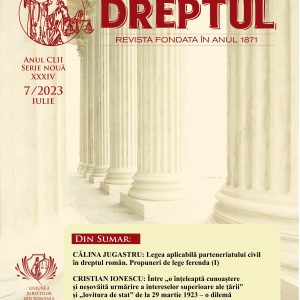
-
 Este foarte dificilă cercetarea noțiunei de ordine publică și determinarea conținutului acestei noțiuni este cu totul anevoioasă. Nu există, poate, în drept și în sociologie, o mai confuză noțiune, dar care să-și găsească mai variate câmpuri de aplicație și de care să se facă uz mai des, mai ales în ultimele timpuri, atât în relațiile particulare dintre indivizi, cât și în legăturile și raporturile dintre Stat și individ de o parte sau dintre State, de altă parte. Stabilirea conținutului exact al ordinei publice și analizarea tuturor efectelor sale depășesc cu mult cadrul normal al unui articol, chiar mai lung, dintr’o revistă juridică. Vom căuta totuși, în cele ce urmează, a schița rapid datele problemei, fără a pretinde că, în acest fel, am epuizat subiectul; de altminteri, intenția noastră nu este decât de a face o sumară introducere în examinarea acestui subiect a cărui analiză poate face obiectul unui întreg tratat.
Este foarte dificilă cercetarea noțiunei de ordine publică și determinarea conținutului acestei noțiuni este cu totul anevoioasă. Nu există, poate, în drept și în sociologie, o mai confuză noțiune, dar care să-și găsească mai variate câmpuri de aplicație și de care să se facă uz mai des, mai ales în ultimele timpuri, atât în relațiile particulare dintre indivizi, cât și în legăturile și raporturile dintre Stat și individ de o parte sau dintre State, de altă parte. Stabilirea conținutului exact al ordinei publice și analizarea tuturor efectelor sale depășesc cu mult cadrul normal al unui articol, chiar mai lung, dintr’o revistă juridică. Vom căuta totuși, în cele ce urmează, a schița rapid datele problemei, fără a pretinde că, în acest fel, am epuizat subiectul; de altminteri, intenția noastră nu este decât de a face o sumară introducere în examinarea acestui subiect a cărui analiză poate face obiectul unui întreg tratat.
